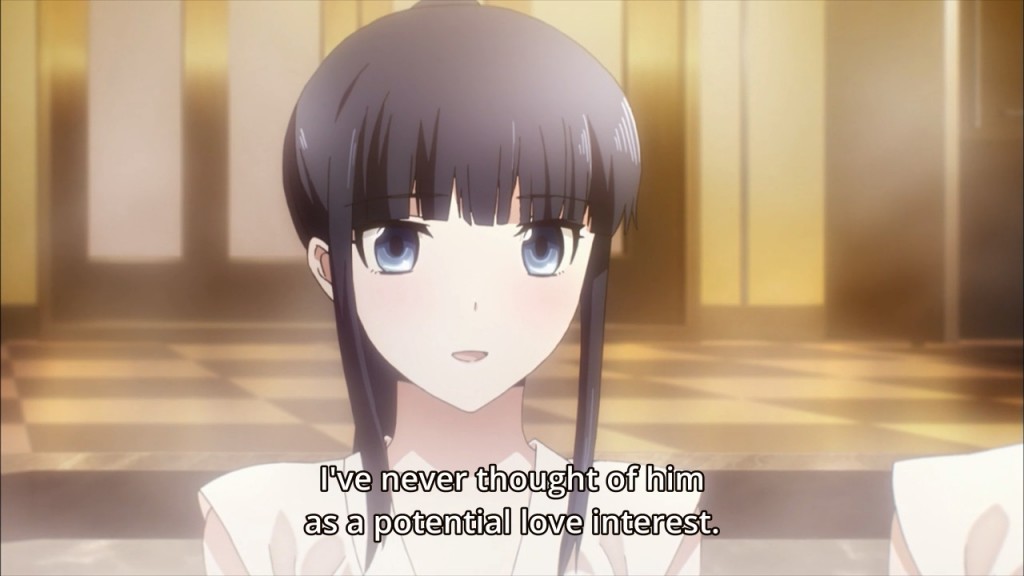06.10
After a break, I hope the show has changed enough so I have new things to disc—
“Well, criminals and terrorists are cowards to begin with.”
“And that big brother… well, he’s a badass.”
“It’s very becoming, and you look lovely, but I don’t think it’s appropriate.”
“But it’s like gender doesn’t even matter anymore… looking at you, Miyuki…”
“Onii-sama…”
—well, nevermind. I didn’t write an article for last week due to a combination of illness and sloth, with hallucinations on how to write about Mahouka without complaining about Tatsuya’s lack of character or Miyuki’s hypocrisy regarding social relations for the third time in a row. But if the show’s going to keep generating these perceived flaws, that just means having to look at these issues from another angle.
I’ll take the party as the focal point for this episode, with Tatsuya and Miyuki mingling with other nobles while Erika makes do as a maid. Looking back to this scene brings to mind another show with often-questioned ideals, Downton Abbey. Like Mahouka, Downton has a perspective on class relations, but often leans toward the Crawleys for a sympathetic point-of-view rather than the servants. While some of the narrative paints the servants like Bates and Carson as people, the working class also features the repugnant members of the cast like O’Brien and Barrow. That becomes a criticism I’ve seen when looking at this show, that portraying the privileged Crawleys as curt but overall upstanding human beings offers a disconnection between the audience and story. What the Crawleys go through might not correspond with what a viewer might go through, causing difficulty in seeing the show as a human drama.
And that viewpoint ties to Mahouka through the party scene, since you see all these characters among high society, but it doesn’t do so much to open up their characters but instead to seem a bit self-congratulatory. After a few rescues from attempted murder, let’s give Tatsuya a pat on the back by briefly forgetting his Weed status and have him dine with the “finer” folk. It seemed to be a point to establish ideas for the next arc, especially with the black-eyed guest who will probably do something evil for whatever’s sake. But few points are really cemented, as Tatsuya has not even had an actual interaction with his rival Misaki yet despite the opening showing otherwise. It’s the tenth episode, and that portrays them as sworn enemies at a standoff. But here, I don’t get any feeling that these two have even a surface appraisal of each other.
But the show seems intent on portraying events without detailing the character behind the actions. Like the car crash at the beginning, there’s no dramatic tension. Absolutely none of the characters will face injury. And in the end, it’s just an excuse to explain how magic works in a way that could cause a car to crash like that. It feels like an example straight out of a textbook warning of the dangers of magic rather than something that could happen to the characters, posing no risk at the expense of characterization. The characters aren’t allowed to do their own thing, instead spouting out rules of magic or what the author sees as ideal social customs.
And by ideal social customs, the author paints his idea of a desirable woman in an unfortunate light. First off, there’s that scene where Miyuki scolds Mizuki for wearing a blouse that shows off her cleavage. Then, there’s the hot springs scene where all the girls admire Miyuki’s body but in a “Not too gay, because that would be weird” sense. If Tatsuya’s going to be seen as the resident Gary Stu, then it would be logical to see Miyuki as the author’s idea of an ideal woman. And if the past episodes are anything to go by, that’s a bit unnerving. Why is the author painting her as the character the other girls should look up to? By doing that, Miyuki becomes the author’s mouthpiece for acceptable behavior in the show. Miss Jane Bennet would think Miyuki was too uptight. Admittedly, it would too much of a leap to think the creator made Miyuki as a self-insert love interest, but the way she’s portrayed while with her brother makes it not too hard to cast such a statement.
